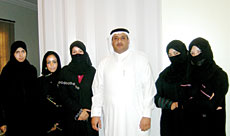JEDDAH, 29 August 2007 — Saudi women studying law at King Abdul Aziz University (KAAU) are pushing to practice in an all-male domain on graduation next year.
Twenty-four women attended this summer a six-week training course in law, which included mock trials of real life cases. The course — the first of its kind — was hosted by the National Society for Human Rights (NSHR).
“It is our right to practice law and we are needed here,” stressed Hanouf Al-Hazaa, 23. Al-Hazaa is one of five students who conducted a study after attending the course. The study is aimed at explaining the social, religious, economical and educational reasons that would allow them to practice law. Apart from Al-Hazaa, the other four students who conducted the study are Eman Ayash, 23, Hadia Balkyour, 21, Dareen Al-Mubaraki, 22, and Nourah Fairoozy, 23.
The study was conducted under the supervision of Dr. Hussain Al-Sharif, a member of the NSHR’s Inspection and Follow-up Committee. Al-Sharif said that the only thing that was missing in their course was “field trips to jails and courts.”
“We have promised them that as soon as we manage to organize trips we will take them. These students have the knowledge, enthusiasm and persistence to deal with women and cases like their male peers. We believe they will be successful,” he said.
The NSHR is now willing to offer the course to other Saudi law students. “If any university wants to run this program again with the cooperation of the NSHR, then we welcome the idea,” he said.
The course included around 12 instructors in addition to experts — lawyers, journalists and theologians — who came to share their knowledge with them. The students were introduced to real-life cases with the NSHR. They learned how to prepare and write their cases professionally and how to deal with the media.
As part of the study, students tackled different issues. Balkyour for example handled the importance of having Saudi lawyers and legal consultants in the education field and highlighted their role in spreading awareness at schools and universities.
Al-Hazaa surveyed the economical and social benefit of having women lawyers. She said if there were women, who could be there to help and advise, the level of awareness of issues among women would increase and their problems would decrease.
“Saudi women who studied law abroad were forced to work in other Gulf countries instead of offering what they have learned to their country,” she added.
She also pointed out that many Saudi businesswomen are now working and women lawyers could guide them. She added that, according to the Ministry of Justice, there are 1,087 male lawyers practicing in the Kingdom. This means that each lawyer serves around 20,000 Saudis. “This is a huge number not to mention that Saudi Arabia’s women make up 45 percent of the population,” she said.
“Now that we have acceded to the World Trade Organization, a ticklish issue may occur. If we are not allowed yet to practice law here, what would happen if a foreign company had a problem and their lawyer was a woman? I believe we have the right to be there standing in our courts first,” said Al-Hazaa. “We are already in the courts registering complaints, so why can’t we defend!”
Regarding the claim that it is not appropriate for men and women to mix, she said: “With respect to all jobs, practicing law is as important as medicine, business and media or more.”
Some people believe it is hard for a woman to go to court but the students disagreed. According to Al-Mubaraki and Ayash, who covered the religious part of the study, there is no Qur’anic verse banning women from becoming lawyers. A lady once went to the Prophet Muhammad (peace be upon him) asking him if she could perform Haj on behalf of her father. The Prophet allowed her to do so. “If she managed to do Haj, which is a difficult pilgrimage, I am sure she could become a lawyer and go to court,” said Al-Mubaraki.
Fairoozy pointed out that the Ministry of Justice might allow them to become law consultants. “It is good as a first step but we would still need agents to go to the courts and it is going to be hard. These cases require us to be there ourselves and witness everything,” said Fairoozy.
The study was presented to NSHR officials, who will present it to Custodian of the Two Holy Mosques King Abdullah once it is approved. “We will make sure it is completed in the appropriate way because the students have been working hard on it and we wish for great results,” said Al-Sharif.
Suhaila Hammad, a senior member of the NSHR, said the students did a great job presenting their study. She added that the NSHR has been requesting this issue for a while now. “I am supporting the concept of allowing women to practice law because it would solve many problems, especially since some women fear or feel embarrassed when dealing with male lawyers,” she said.
Saudi lawyer, Mutlag Al-Najrani, praised the NSHR for offering students the course. He said if law offices were accredited by the Ministry of Justice to offer women law students training, just like men, then they would benefit more. “Men get the benefit and the women need it too but we could not do anything about it unless the ministry gives us permission,” he said.
As the new educational year begins in September, Dar Al-Hekma College will open a new law department. This will be the third college offering law in Saudi Arabia to women. The first is KAAU, and the second is King Saud University in Riyadh.
“Parents are now proud to have their daughters study law just as medicine and this is what keeps me and my colleagues strong. We want to make them proud,” said Balkyour.


